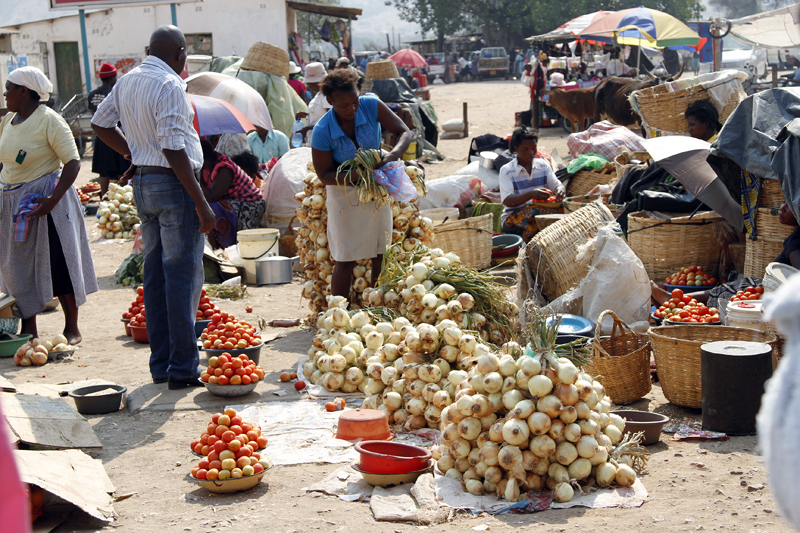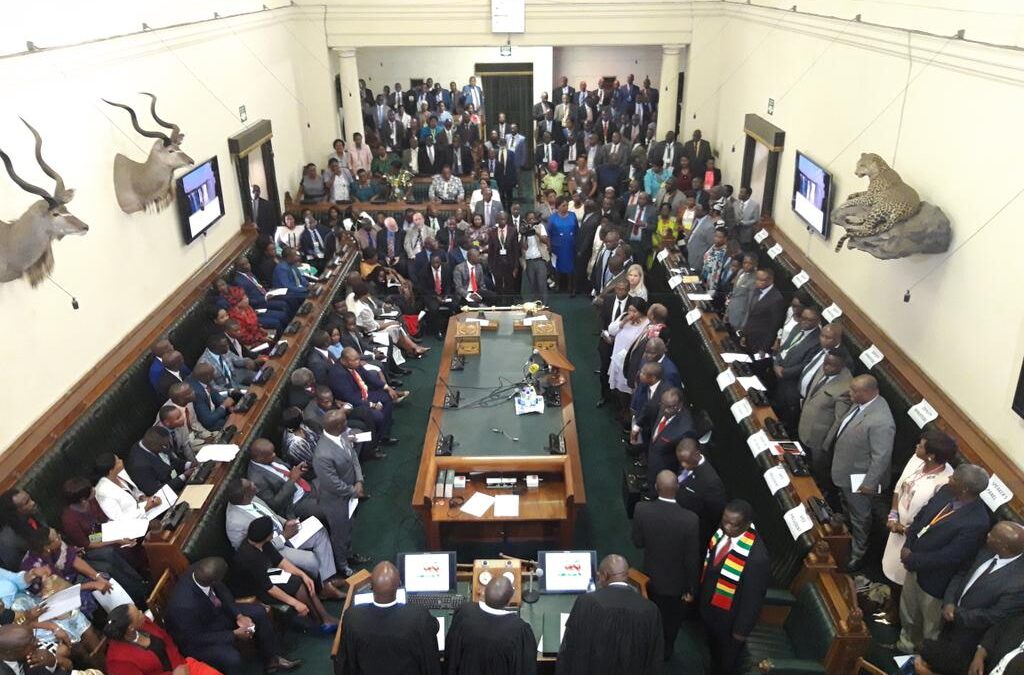Nevanji Munyaradzi Chiondegwa
The economy of Zimbabwe has been reeling under sanctions and debts for more than 18 years. As a result, the country has struggled to have proper social services like schools, hospitals and infrastructure like roads, buildings, housing and telephone network. This problem was inherited first from the Rhodesian administration which only provided these services to the white minority who only made up 10% of the population, and the Robert Mugabe administration whose main concern was to maintain power at the expense of developing the country.
Previous efforts to expand social services were financed by funds that were borrowed from multilateral lending institutions whom we ended up owing huge debts. The country’s production slowed down due to the infamous Economic Structural Adjustment Program (ESAP), as the country failed to meet its payment schedules to service its debt. With problems compounding at home including unemployement, drought and workers and student unrest, authorities focused more on controlling than finding solutions to the problems. They became paranoid instead of seeing policies through. The desire to maintain power saw the country jumping from one policy to the other until the country had it land reform. Although it was a necessary policy, the manner in which it was conducted plunged the country into serious production and food deficits which the turned the country from being Africa’s bread basket into a basket case.
The chaotic land reform exercise could have been addressed, corrected and fixed to restore production. However, the fear of losing power saw cronies being rewarded with land which they could not utilize. The powers that be chose not to address it correctly and politicized a policy that was supposed to be addressed as a socio-economic matter from an non-political angle. Those mistakes together with sanctions have crippled the country’s once vibrant economy. The economy is on a tailspin and we have been hearing all sorts of predictions on its revival. We have begged and begged for the removal of sanctions but to date nothing has been done. The sanctions were smart in that they targeted areas that we would have used to bust them.
Ian Smith’s administration was also under sanctions but the country did not feel their effects because of mechanisms which he put in place to bust them. The question on everyone’s mind now is, why is Zimbabwe feeling the effects of sanctions when the country was inherited from an administration which had mechanisms in place to bust them? Well, one may argue that Smith had a smaller population size than that of today but that would be a shallow argument. The problem lies with our Economic cluster section of the policy makers and implementers. The Ministries of Industry and Commerce, Finance and RBZ are not thinking conceptually towards rebuilding the economy.
The RBZ and Finance Ministry are implementing fine-tuning measures as solutions to a problem that requires a total rebuild. They are busy focusing on controlling the exchange rate which is really not the problem. We have a structural problem which causes functionality problems. The chaps at Industry and Commece are clueless. I dont think they even know what is industry or commerce for that mtter. Unless if my understanding of basic macroeconomics is off, Mangudya and his team are running a tuckshop instead of a Central Bank. The Economy can not be built that way and certainly sanctions cannot be busted that way.
Every policy, measure, action done by the Zimbabwean fiscal and monetary authorities is linked to exchange rates. That is not building the economy. I used to think they do not listen but now I know they listen, their problem is understanding. The two former classmates, Prof Mthuli Ncube and Dr Mangudya do not understand where we are. As I once tried to explain in other previous articles on our current situation, the solutions coming from the authorities are like trying to implement exchange rate related measures in a country like DRC and say you are trying to uplift the economy. It will not work!
That is why I always speak about rebuilding the primary industry: Agriculture and Mining along with Infrastructural development and gentrification of cities and towns. The Zimbabwean economy is agricultural based. The country had 350 thousand jobs in the 90s from Agriculture alone, a figure which could have trebled today if we did not take our eyes off the ball and abuse the land reform program instead of boosting production. The agricultural sector alone has a bigger impact on the local industry, government budget and people’s lives than incentivizing exporters. RBZ is busy incentivising exporters instead of putting money in real production. The downstream industries that can benefit from Agriculture alone could be so immense that we could be talking about meeting the 2 million job targets that were promised in the Zanu PF elections manifesto and even surpass them.
Mining can also boost employment and the economy and benefit other industries like construction, railways, power production, manpower development, export earnings, royalties, infrastructure development and many other things. Communities around mining towns always tend to benefit from the establishment of such. One simply has to look at what Unki has done for Shurungwi after the collapse of production at Zimasco, and what Mimosa and Murowa have done for Zvishavane to understand the impact of mining to the Economy.
It takes no genius to know that our focus shld be on the two, Agriculture and Mining because these sectors automatically boost infrastructure development. When our economy was agricultural based, industries thrived in Bulawayo. So lets go back to basics instead of putting bad policies that focus on controlling and hampering economic growth. No one has ever built an economy on the basis of immediate trade. Incentivizing exporters and worrying about increasing forex is not the way to go. Its like a person from Chivi trying to grow cash crops like tobacco and sugar cane for trade only to fail and realize that he does not even have food to eat. That is a sure sign of failure.
We need to change and shift our focus. The use it or lose it policy must be implemented with seriousness. If one has a mining claim that he use for speculative purposes, it’s better to take that claim and give it to those who want to use it. If one has land for agricultural purposes and is not using it, better to take that away too. We own the land, in fact the State owns the land and a better incentive would be to say; each farmer is to grow at least 5 hactres of maize per season which he sells to the State as a strategic reserve. What ever he does with the rest of the land must also be noted. If it is a miner, certain targets must be met.
The Central Bank and Treasury should work hand in glove with the Agriculture and Mining sectors to work on incentivizing the two areas. Agriculture is currently one of the biggest forex earners through tobacco, yet our policies seek to strangle the farmer. Miners are also the biggest forex earners including artisinal miners. Why not rather incentivise those? We have money being given to food importers like Grain Millers Association of Zimbabwe instead of putting it to Agriculture to boost maize and other food crop production to avoid the need to import!!
How will we ever bust sanctions and build the economy when we acting like vagabonds? We are not focusing on importing technology or knowledge exchange but basics which we could easily substitute here locally. Why import pizza base? Why import fat and oils for cooking? Why import soap? The question we should be asking ourselves for every import is; “Could we not have made this locally? Was there no local alternative?” The kinds of controls which I am sure, myself and hundreds of other Zimbabweans want to see are those that revive local industry via import subsititution, that lead to employment creation, grow our food strategy reserves, boost our State coffers and ensure future production increase.
It cannot be so difficult really but we have been looking on the wrong end of issues! Immediate trade does not built the Economy! Devolution should allow us to focus on specializing in farm produce perculiar to a certain area. This will lower a need to import everything. Whatever we used to grow or make locally, should be grown and made again. We still have the land, still have the factory shells. Retool them, we have enough educated manpower or we can train them seeing that we have enough tertiary institutions. Incubate the necessary skills!
Enough is enough! Lets think about the future of the country!





0 Comments